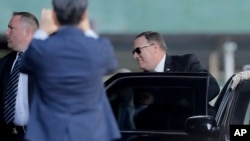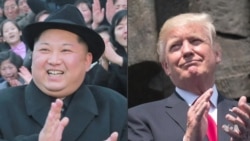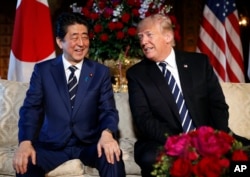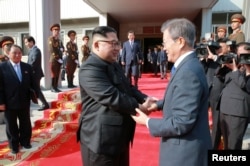U.S. Secretary of State Mike Pompeo will meet later this week with a North Korean four-star general in New York for talks related to a planned summit between President Donald Trump and North Korea's leader, according to the White House.
Kim Yong Chol, the vice chairman of the powerful Central Committee and North Korea's former spy chief, departed Beijing on an Air China commercial flight Tuesday for John F. Kennedy International Airport.
Earlier in the day, Trump tweeted that Kim's visit is a "solid response to my letter, thank you!"
"Kim Yong Chol is the man who whispers in Kim Jong Un's ear. Not only does he advise him on strategy but he also conveys the leader's demands. He'll be coming to New York to negotiate on Kim Jong Un's behalf. It's another very strong sign of commitment to this summit," said Jean Lee, director of the Korea program at the Wilson Center.
Tough discussions ahead
Lee, former Pyongyang bureau chief for the Associated Press, tells VOA tough discussions should be expected "as the U.S. and North Korean sides try to get on the same page regarding what the two leaders will accomplish at this anticipated summit."
Trump sent a letter last week to North Korean leader Kim Jong Un, saying their scheduled June 12 summit in Singapore would not happen, and blaming what he said was "tremendous anger and open hostility" shown in a statement from Pyongyang. But negotiations between the two countries have continued, including talks at the Korean demilitarized zone.
WATCH: Pompeo N. Korea delegate meet
"If it takes place on June 12th, we'll certainly be prepared. If it, for some reason, takes place at a later date, we'll be prepared for that as well," White House Press Secretary Sarah Sanders told reporters Tuesday afternoon on Air Force One.
A number of factors will determine when it is scheduled, Sanders added.
"Denuclearization has to be on the table on the focus of the meeting," she explained. "And the president has to feel like we're making progress on that front."
A U.S. delegation is meeting with a North Korean delegation in the demilitarized zone, led by Sung Kim, who is the U.S. ambassador to the Philippines and a former envoy to South Korea. Also present are Allison Hooker, Korea director on the National Security Council, and Randy Schriver, who is the assistant secretary of defense for Asian and Pacific Security Affairs.
Additional meetings are planned this week.
Separately, White House Deputy Chief of Staff Joe Hagin is leading a pre-advance team in Singapore coordinating the logistics of the expected summit.
It has also been announced that Trump is to meet Japanese Prime Minister Shinzo Abe at the White House on June 7.
Japan concerned
Behind the scenes, Japanese officials have expressed anxiety the Trump-Kim summit might sideline their priorities, especially North Korea's short- and medium-range missiles, and the fate of Japanese citizens abducted over decades by North Korean agents.
"We would like to see comprehensive verifiable irreversible dismantlement [CVID] of nuclear weapons and other weapons of mass destruction, the ballistic missiles dismantled irrespective of range, as well as addressing the abduction issue," Koro Bessho, Japan's ambassador to the United Nations, told reporters on Tuesday.
"Abe wants to get the precise nuance of the U.S. negotiating policy," said Yoichi Sato, a professor of international security studies at Ritsumeikan Asia Pacific University.
Abe has strongly supported the Trump administration's CVID stance, and Sato tells VOA that "for the U.S. to move from that means there is a great implication for Japan's standing, especially Japan's stance on the presence of U.S. troops on the Korean peninsula."
South Korean President Moon Jae-in could also be going to Singapore next month for a three-way summit with his U.S. and North Korean counterparts, a government official in Seoul said Monday.
After a surprise meeting Saturday with Kim Jong Un, Moon said the North Korean leader is still committed to the "complete denuclearization" of the Korean peninsula.
North Korea has rejected unilateral disarmament and called for denuclearization of the Korean peninsula without defining what that entails.
The North Koreans, after expressing initial enthusiasm about diplomacy with the United States earlier this month, did not show up for a preparatory meeting in Singapore.
Angers U.S.
North Korean Vice Foreign Minister Choe Son Hui also was quoted by the country's official news agency threatening to use nuclear force and she referred to U.S. Vice President Mike Pence as a "political dummy."
That angered Trump, who then wrote a letter to Kim Jong Un calling off their summit.
North Korean state media quickly replied with a conciliatory statement, reporting Kim's "fixed will" that his summit with Trump should go ahead.
For veteran observers of the opaque North Korean regime, the speed and intensity of the turnaround was remarkable.
"Trump is something new and his warnings that military force might be used, I think, have been taken seriously," Grant Newsham, senior research fellow at the Japan Forum for Strategic Studies, told VOA. "Plus, there has been fair amounts of pressure, compared to the past, put on the Chinese economically."
Ira Mellman, Victor Beattie and VOA's Korean Service contributed to this report









